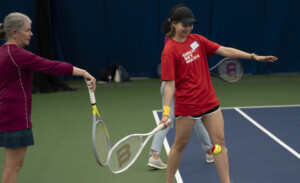Tennis is more than a sport; it’s a gateway to empowerment and inclusivity. Its appeal lies in the rhythm of the game, the strategy, and the ability to bond communities through a shared passion. However, accessing tennis hasn’t always been equitable. And yet, Tennis Canada is changing that narrative through a pioneering partnership with Big Brothers Big Sisters Toronto.
One of the goals of the partnership is to show that tennis is a sport anyone can enjoy and to make tennis more accessible for underserved kids in the Greater Toronto Area, while partnering with one of the best not-for-profit youth advocacy organizations in Toronto.
The catalyst: UNMATCHED Gender Equity in Sports Conference 2022
The catalyst for transformative change emerged during Tennis Canada’s inaugural UNMATCHED Gender Equity in Sports Conference in August 2022. This conference was a key component of Tennis Canada’s gender advancement and equity strategy, supported by National Bank. The primary aim was to move beyond theoretical discussions and translate research-based insights into tangible actions that could positively impact the sports landscape. The audience was challenged to “find their forward” to advance gender equity in sport in Canada.
 One of the notable speakers that emerged during this conference was Leanne Nicolle, the President and Chief Executive Officer of Big Brothers Big Sisters Toronto. With an extensive background in sports, Nicolle brought a unique perspective to the table, highlighting the critical need to reach those who face barriers preventing them from accessing sports. Her emphasis on going beyond those with existing access and considering those who couldn’t fathom participating due to various challenges set the stage for a groundbreaking collaboration.
One of the notable speakers that emerged during this conference was Leanne Nicolle, the President and Chief Executive Officer of Big Brothers Big Sisters Toronto. With an extensive background in sports, Nicolle brought a unique perspective to the table, highlighting the critical need to reach those who face barriers preventing them from accessing sports. Her emphasis on going beyond those with existing access and considering those who couldn’t fathom participating due to various challenges set the stage for a groundbreaking collaboration.
Tennis Canada’s passion for inclusivity aligned with Big Brothers Big Sisters of Toronto’s dedication to mentorship. The partnership wasn’t just about playing tennis; it was about leveraging the sport to create meaningful mentorship opportunities for youth facing adversities.
The need for non-traditional partnerships
To provide context and rationale for the collaboration, some compelling statistics underscored existing gaps in sports accessibility. MLSE Foundation (2021) and Canadian Tire Jumpstart (2023) found that 75% of parents thought organized sports needed to be more financially accessible, 44% of parents felt financial constraints prevented their children from participating in organized sports and 60% of youth in Ontario are without access to sport wear. Additionally, research showed 23% of those who participate in sport have a strong sense of community compared to only 7% of youth who do not participate (State of Sport Report 2023 and Change the Game Research 2.0. 2021).
Leveraging research for impactful partnerships
While research proved to play a pivotal role in driving the impact of the partnership, the UNMATCHED Conference provided a platform to bridge the gap between theoretical discussions and tangible actions. Nicolle’s insights, grounded in experience, showed the need to move beyond surface-level discussions and address the root causes of disparities in sports accessibility.
The strategic partnership unveiled
 The breakthrough moment occurred when Big Brothers Big Sisters of Toronto revealed its well-researched mentorship programs and the significant impact on health and social outcomes, particularly for children in equity-deserving communities. Recognizing the potential for aligning their goals, Tennis Canada saw an opportunity to use its resources, including Sport Canada funding through its Community Sport For All Initiative, to create a unique and mutually beneficial partnership.
The breakthrough moment occurred when Big Brothers Big Sisters of Toronto revealed its well-researched mentorship programs and the significant impact on health and social outcomes, particularly for children in equity-deserving communities. Recognizing the potential for aligning their goals, Tennis Canada saw an opportunity to use its resources, including Sport Canada funding through its Community Sport For All Initiative, to create a unique and mutually beneficial partnership.
Crucially, the collaboration wasn’t a one-size-fits-all approach. Tennis Canada recognized the need to leverage existing programs, certified coaches, and tennis facilities to create accessible and enjoyable experiences. With a grant of $75,000 from Sport Canada, Tennis Canada initiated a pilot project to introduce tennis to Big Brothers Big Sisters of Toronto’s ‘Littles’ (mentees) and ‘Bigs’ (mentors) throughout 2023.
Their mission was clear: to increase tennis participation among youth, particularly engaging young girls, and to cultivate a robust network of mentors and volunteers. It was an effort to democratize a sport that holds immense potential for personal development and community cohesion. And this collaboration wasn’t merely theoretical; it was grounded in practical strategies.
Implementation: From try-it days to grand tournaments
The pilot project implementation encompassed try-it days, exposure to inspiring professional sports events, and dedicated days at prestigious tournaments like the National Bank Open in August 2023. These initiatives aimed not only to introduce the sport but also to provide the participants with a sense of belonging.
The outcomes of the pilot project were impressive. Over 140 participants from underserved communities experienced tennis, with 72% feeling they learned to play, 89% motivated to try new activities, and 94% expressing confidence in exploring new endeavors. The impact extended beyond sports, fostering connections, empowerment, and community engagement.
Sustainability: A work in progress
The sustainability of the program remains a work in progress. Tennis Canada has applied for additional funding to expand and replicate the initiative. The ultimate goal is to create a foundation for sport literacy, providing tools and opportunities for continued participation.
While Tennis Canada’s initiative focused on introducing sport to underserved communities, there is a need to balance programmatic efforts with addressing broader social issues, which is something that organizations like Big Brothers Big Sisters of Toronto is already tackling.
Looking ahead: Transformative potential
 The collaborative efforts between Tennis Canada and Big Brothers Big Sisters of Toronto not only showcased the immediate impact on participants but also raised critical questions about the transformative potential of sports partnerships. While the initiative focused on introducing sport to underserved communities, it also opens avenues for further exploration into how sports partnerships, including the integration of impactful sport research and insights, can be transformative on a broader societal scale.
The collaborative efforts between Tennis Canada and Big Brothers Big Sisters of Toronto not only showcased the immediate impact on participants but also raised critical questions about the transformative potential of sports partnerships. While the initiative focused on introducing sport to underserved communities, it also opens avenues for further exploration into how sports partnerships, including the integration of impactful sport research and insights, can be transformative on a broader societal scale.
Beyond the field: Social impact of sports
Tennis Canada’s collaboration with Big Brothers Big Sisters of Toronto wasn’t just about fostering a love for a sport; it was about pioneering a model for social change. The call to action is clear; think differently, collaborate intentionally, and turn theory into impactful action.
By prioritizing inclusivity, mentorship, and evidence-based strategies, this partnership moves past the conventional role of sports organizations. It challenges sport organizations and researchers to consolidate resources and strategy, reassess their approaches, prioritize collaboration, and consider the broader societal impact of their initiatives. As well as demonstrating the power of accessible and positive sport experiences to build a more equitable and compassionate society.
This information was part of the keynote speech delivered at the Sport Canada Research Initiative (SCRI) conference in October 2023.